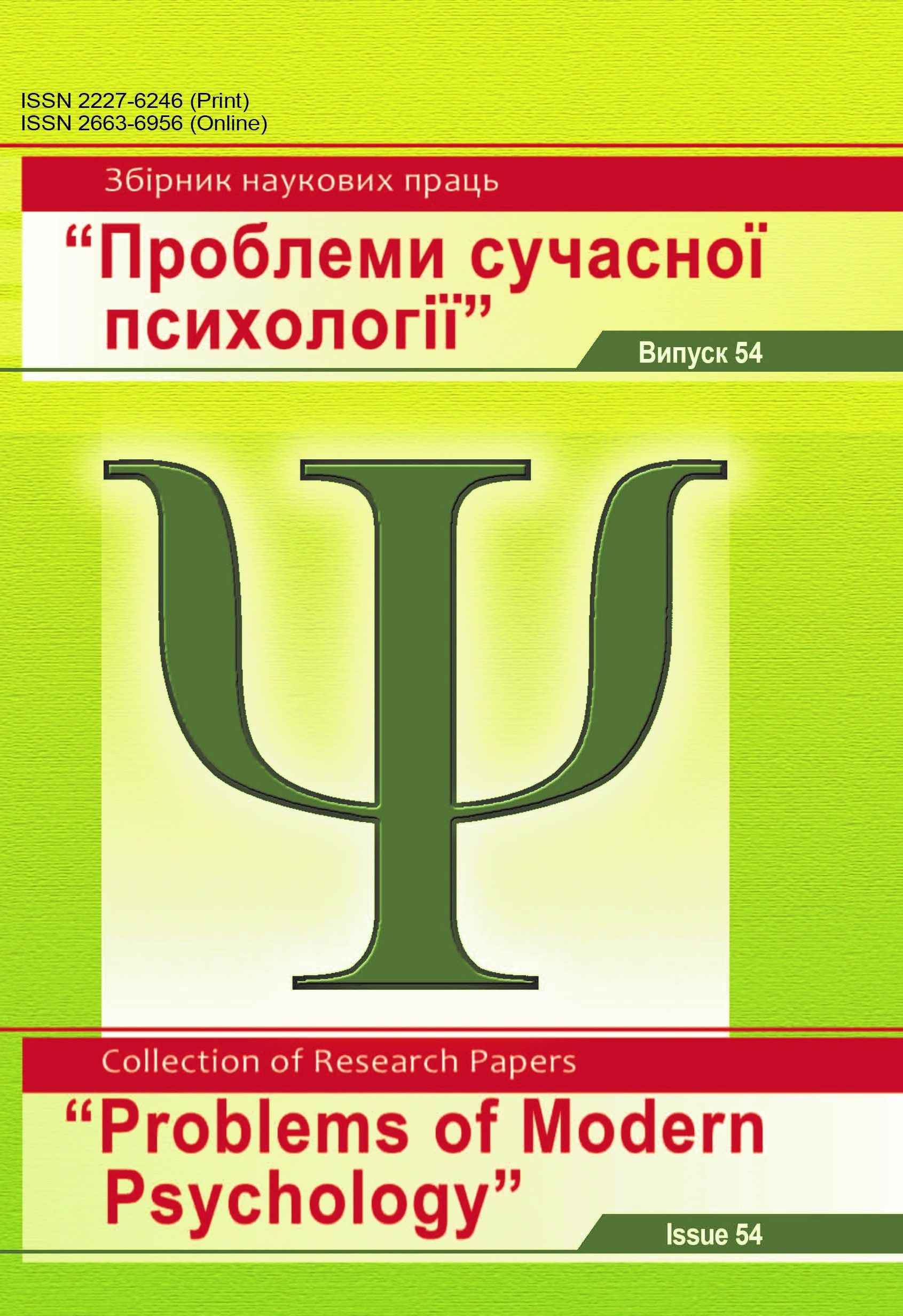Specifics of Mediated Memorization Ability of the Adult Internet Users
DOI:
https://doi.org/10.32626/2227-6246.2021-54.78-92Keywords:
higher mental functions, mediated memorization, pictogram, active web-usersAbstract
The aim of the article is to describe the specifics of a mediated memorization ability of the Internet users (the IU) to memorize new words (familiar/unfamiliar, words that describe certain/abstract concepts).
Methods. The research involved 70 respondents aged 37–53. All the responders have a higher education and work in spheres of intellectual labor (education, culture and healthcare). The respondents were divided into two groups based on their preferences of a coding system: the Internet users (the experimental group, EG) and the Reading Subjects (the control group, CG).
The pivotal tool in the research was the pictogram technique. It was modified by an extra row. An additional row comprised foreign, unknown words. Instructions, timing and order met the basic requirements of the technique in both cases.
Results of the research. A number of recognized familiar words is equal in both groups. There are statistically significant differences (p ≤ 0.01) in recognition of unfamiliar terms. Moreover, there is a significant difference (р ≤ 0.01) in recalling abstract concepts in the row of unfamiliar words. In both cases, the reading subjects showed fewer mistakes in recognizing words.
Analyzing the data, no correlation between the age and the quantity of right answers has been detected both in the experimental and control groups.
Conclusions. The hypothesis that the Internet use has deforming consequences for the mediated memorization has been proved. The deformation leads to a deterioration in memorization of new information, especially when it is generalized.
References
Bogacheva, N.V., & Spivak, E.V. (2019). Mify o «pokolenii Z» [Myths about «Generation Z»]. Moskva : Vysshaia shkola ekonomiki [in Russian].
Bulyko, A.N. (2007). Bolshoi slovar inostrannykh slov [A large dictionary of foreign words]. Moskva : Martin [in Russian].
Rubinshtein, S.Ya. (2004). Eksperimentalnyie metodiki patopsikhologii i opyt primeneniia ikh v klinike. Prakticheskoie rukovodstvo [Experimental methods of pathopsychology and experience of their application in the clinic. A practical guide]. Moskva : Aprel-Press: Izd-vo Instituta psikhoterapii [in Russian].
Sultanova, A.S., & Ivanova, I.A. (2017). K probleme normativnykh pokazatelei v patopsikhologicheskoi diagnostike [To the Problem of Normative Data in Pathopsychological Diagnostics]. Klinicheskaia i spetsialnaia psikhologiia – Clinical Psychology and Special Education, 6 (2), 83–96. Retrieved from https://psyjournals.ru/files/86348/Sultanova_Ivanova.pdf. DOI 10.17759/psyclin.2017060207 [in Russian].
Tkhostov, A.Sh., Rasskazova, E.I., & Emelin, V.A. (2019). Psikhicheskoie zdorovie v kontekste informatsionnogo obshchestva: k voprosu ob izmeneniiakh v patogeneze i patomorfoze zabolevanii (na primere narushenii tsikla «son – bodrstvovaniie» [Mental health in the context of information society: to the issue of changes in the pathogenesis and pathomorphism of diseases (on the model of disturbances of the sleep – wake cycle)]. Konsultativnaia psikhologiia i psikhoterapiia – Consultative Psychology and Psychotherapy, 27 (3), 44–60. DOI 10.17759//cpp.2019270304 [in Russian].
Prensky, M. (2001). Digital natives, Digital immigrants. On the Horizon, 9 (5), 1–6. DOI 10.1108/10748120110424816.
Downloads
Published
How to Cite
Issue
Section
License
Copyright (c) 2021 Elena Medvedskaia

This work is licensed under a Creative Commons Attribution-NonCommercial 4.0 International License.
Copyright
The Editorial Board has the full right to publish original scientific papers containing results of theoretical and experimental research works which are not currently subject to review for publication in other scientific editions. The Author shall transfer to the editorial board of the Collection the right to spread the electronic version of the paper, as well as the electronic version of the paper translated into English (for papers originally submitted in Ukrainian and Russian) by all kinds of electronic means (placement at the official website of the Collection, electronic databases, repositories etc).
The Author of an article reserves the right to use materials of the paper, without approval with the editorial board and the founders of this Collection: a) partially or fully, for educational purposes; b) for writing own dissertation papers; c) for preparation of abstracts, conference reports and presentations.
The Author of an article can place electronic copies of the paper (including the final electronic version downloaded from the official website of the Collection) at:
- personal web resources of all Authors (websites, webpages, blogs etc.);
- web resources of the institutions where the Authors are employed (including electronic institutional repositories);
- non-profit public access web resources (for example, arXiv.org).
But in all cases, it is obligatory to have a bibliographic reference to the paper, or a hyperlink to its electronic copy placed at the official website of this Collection.






